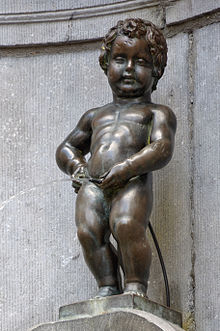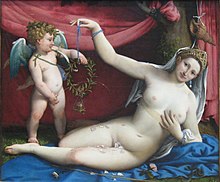Puer mingens
: puerī mingentēs [ˈpʊ.ɛr.iː mɪŋ.ˈɡɛn.teːs])[1] is a figure in a work of art depicted as a prepubescent boy in the act of urinating, either actual or simulated.
[2] On account of this, the urine emitted from the penis of the puer mingens can be interpreted symbolically as semen; and pueri mingentes are frequently found in works auguring fertility and fecundity.
[8] Donatello, who paved the way in the reinvention of the larger motif of the putti in sculpture, depicted one of the earliest Renaissance examples of a puer mingens on the base of his Judith and Holofernes statue.
[7] From the Renaissance onward, the puer mingens can be found in both secular and religious art and across a range of media, from illuminated manuscripts, functional fountains, frescoes, to apotropaic amulets.
[7] In addition to public spaces, such as the Manneken Pis's location in central Brussels, functional fountains also graced many private sixteenth- and seventeenth-century gardens across Europe.



